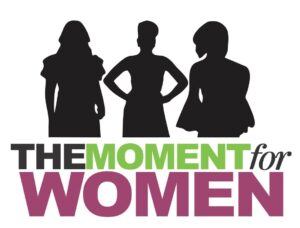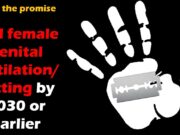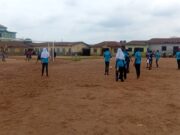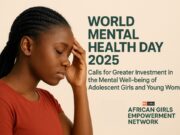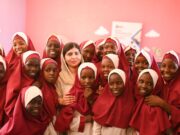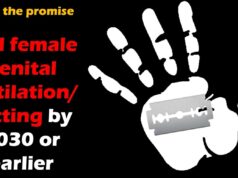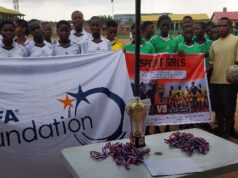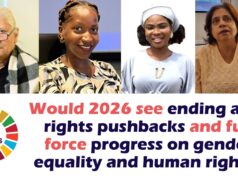In a candid conversation with Ms. Matina Ebri, an advocate for adolescent and youth sexual and reproductive health and rights, and the Administrator of the African Girls Empowerment Network (AGE Network), we explore the groundbreaking Belle by Choice Initiative Campaign and its transformative impact on reproductive health rights in Nigeria.
Thank you for the opportunity to meet with you, Matina. Let’s start with the basics. What exactly is the Belle by Choice Initiative, and why is it so significant?
Matina Ebri: Thank you for having me! The Belle by Choice Initiative is our flagship program, launched in September 2021, with funding from the African Women Development Fund and the Global Fund for Women. The term “Belle” is a pidgin word for “pregnancy,” and this initiative focuses on ensuring that women and adolescent girls in Nigeria can make informed and empowered choices about when and if to carry a pregnancy. It’s a holistic, gender-transformative approach aimed at flattening the curve of unwanted pregnancies while addressing issues like unsafe abortion, school dropouts, child marriage, and preventable maternal mortality.
That’s impressive. What inspired the launch of this initiative?
Matina Ebri: The Belle by Choice Initiative was inspired by the urgent need to address deep-rooted issues like harmful gender norms, sexual violence, and the stigma surrounding contraception and family planning. These are the silent drivers of unwanted pregnancies and unsafe abortions in Nigeria.
During the COVID-19 health crisis and lockdown in 2020, we witnessed a surge in reports and cases of unsafe abortions resulting from unwanted pregnancies among women and girls. At the time, with support from the Global Fund for Women, we were actively responding to the situation through a project called Campaign to Advance the Sexual and Reproductive Health and Rights of Young Women and Girls. This two-year project allowed us to provide critical support and resources during heightened needs.
When we evaluated the outcomes of that project in 2021 Belle by Choice was born to give women and girls the tools and knowledge to reclaim their reproductive rights and ensure pregnancy happens by choice, not by chance.
Since its launch, how has the initiative evolved?
Matina Ebri: It’s grown beyond our expectations. What started as an initiative is now a movement with members across Nigeria’s six geopolitical zones. In 2022 and 2023, we had massive success with campaigns like #10000WomenCarryBelleByChoiceNotByChance and #10000MenGiveBelleByChoiceNotByForce.
These campaigns mobilized thousands of women, girls, and men and relevant stakeholders like the Ministry of Health in Cross River State, Lagos, Ogun, and the United Nations Population Fund Cross River office to champion reproductive health and shared responsibility in preventing unintended pregnancies.
The focus on men in your campaign is unique. Why is their involvement important?
Matina Ebri: Men are critical stakeholders in this conversation. By engaging men and youths through our campaigns, we emphasize their role in supporting women’s choices and addressing issues like rape, sexual & intimate partner violence, and gender inequality.
The #10000MenGiveBelleByChoiceNotByForce campaign, for instance, underscores the importance of consent and shared responsibility.
Beyond advocacy, what practical steps has the Belle by Choice Initiative taken to address unsafe abortion?
Matina Ebri: We’ve taken a multi-pronged approach. First, we’re tackling stigma by providing education about the legal grounds for abortion in Nigeria. Many people don’t realize that while abortion is broadly criminalized, there are specific legal grounds under which safe abortion is permitted, such as cases involving the preservation of a woman’s life or incest. Educating communities about these exceptions is critical, and the lack of awareness is one reason for the high incidence of unsafe abortion among young women.
How does the movement address harmful cultural practices like child marriage and female circumcision?
We also provide free modern contraception and family planning commodities and services to women and girls of reproductive age, ensuring they have access to preventive measures. Beyond that, we engage policymakers to advocate for legal reforms that prioritize women’s health and work toward decriminalizing abortion altogether.
Matina Ebri: These practices are deeply intertwined with unwanted pregnancies and maternal mortality. Through community dialogues and partnerships with traditional and religious leaders, we’re working to shift attitudes and end these harmful norms. Our mission is to create an environment where women and girls can thrive without the burden of these harmful practices.
What has been the most rewarding part of leading this initiative?
Matina Ebri: Watching the transformation in communities has been incredibly rewarding. Seeing women and girls confidently make choices about their lives, and men stepping up to be allies, gives us hope for a better future. The stories of hope and resilience from those who have benefited from the Belle by Choice Movement keep us going.
One of the biggest shifts we’ve seen is the reduction in stigma surrounding reproductive health and rights. For instance, it used to be taboo for a woman—or even a young man—to be seen holding or buying a condom. Today, that’s changing. People are becoming more open about protecting their sexual health, which is a huge win for us as a movement.
What challenges have you been facing?
Matina Ebri: The challenges are significant but not insurmountable. One of the biggest hurdles is the pervasive stigma around reproductive health and rights, which makes it difficult for women and girls of reproductive age to seek help or access services openly. This stigma is deeply rooted in cultural and religious beliefs, making community engagement a delicate process.
Another challenge is the legal landscape. While there are legal grounds for safe abortion in Nigeria, the broad criminalization of abortion creates fear and misinformation, even among healthcare providers. This limits access to safe services and increases the prevalence of unsafe abortions, particularly among young women.
Hyperinflation and economic instability in Nigeria further strain our ability to reach those most in need.
Again, you know, addressing harmful gender norms and social practices, such as child marriage and sexual violence, requires long-term, consistent engagement with communities, traditional leaders, and policymakers. It’s a slow but necessary process to achieve sustainable change.
But despite these challenges, we remain committed to our mission and draw strength from the transformative impact we’re seeing in communities.
What’s next for the Belle by Choice Initiative?
Matina Ebri: We’re working to expand the movement across other countries in Sub-Saharan Africa, building on the successes in Nigeria. Our ultimate goal is to flatten the curve of unwanted pregnancies, end unsafe abortions, and ensure every woman and girl has the freedom to make informed decisions about her body and future. The challenge we have now is funding, a project of this nature requires funding
Funding remains another key challenge for us. The scale of our work—especially in rural and underserved areas—requires substantial resources, from contraceptives and educational materials to training healthcare providers and conducting advocacy and mobility and logistics to go into communities. Sometimes, in some areas, our team has to jump from one vehicle to another, because there’s no vehicle we can hire to take into the communities.
It’s truly inspiring work. Any final message for our readers?
Matina Ebri: Reproductive rights are human rights. By supporting initiatives like Belle by Choice, we’re not just saving lives; we’re empowering women and girls to live with dignity and freedom. Together, we can create a future where no one is left behind.
Resources:
